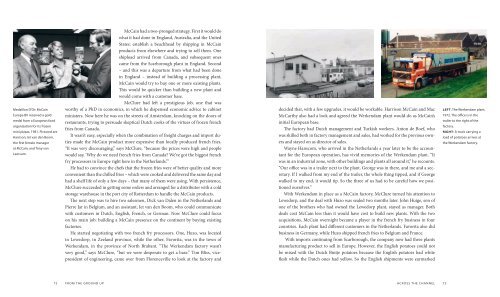From the Ground Up - McCain Foods Limited
From the Ground Up - McCain Foods Limited
From the Ground Up - McCain Foods Limited
You also want an ePaper? Increase the reach of your titles
YUMPU automatically turns print PDFs into web optimized ePapers that Google loves.
Medaillon D’Or: <strong>McCain</strong><br />
Europa BV received a gold<br />
medal from a European food<br />
organization for its frozen<br />
mini pizzas, 1981. Pictured are<br />
Harrison; Iet van den Boom,<br />
<strong>the</strong> first female manager<br />
at <strong>McCain</strong>; and Tony van<br />
Leersum.<br />
<strong>McCain</strong> had a two-pronged strategy. First it would do<br />
what it had done in England, Australia, and <strong>the</strong> United<br />
States: establish a beachhead by shipping in <strong>McCain</strong><br />
products from elsewhere and trying to sell <strong>the</strong>m. One<br />
shipload arrived from Canada, and subsequent ones<br />
came from <strong>the</strong> Scarborough plant in England. Second<br />
– and this was a departure from what had been done<br />
in England – instead of building a processing plant,<br />
<strong>McCain</strong> would try to buy one or more existing plants.<br />
This would be quicker than building a new plant and<br />
would come with a customer base.<br />
McClure had left a prestigious job, one that was<br />
worthy of a PhD in economics, in which he dispensed economic advice to cabinet<br />
ministers. Now here he was on <strong>the</strong> streets of Amsterdam, knocking on <strong>the</strong> doors of<br />
restaurants, trying to persuade skeptical Dutch cooks of <strong>the</strong> virtues of frozen french<br />
fries from Canada.<br />
It wasn’t easy, especially when <strong>the</strong> combination of freight charges and import duties<br />
made <strong>the</strong> <strong>McCain</strong> product more expensive than locally produced french fries.<br />
“It was very discouraging,” says McClure, “because <strong>the</strong> prices were high and people<br />
would say, ‘Why do we need french fries from Canada? We’ve got <strong>the</strong> biggest french<br />
fry processors in Europe right here in <strong>the</strong> Ne<strong>the</strong>rlands.’”<br />
He had to convince <strong>the</strong> chefs that <strong>the</strong> frozen fries were of better quality and more<br />
convenient than <strong>the</strong> chilled fries – which were cooked and delivered <strong>the</strong> same day and<br />
had a shelf life of only a few days – that many of <strong>the</strong>m were using. With persistence,<br />
McClure succeeded in getting some orders and arranged for a distributor with a cold<br />
storage warehouse in <strong>the</strong> port city of Rotterdam to handle <strong>the</strong> <strong>McCain</strong> products.<br />
The next step was to hire two salesmen, Dick van Dalen in <strong>the</strong> Ne<strong>the</strong>rlands and<br />
Pierre Jar in Belgium, and an assistant, Iet van den Boom, who could communicate<br />
with customers in Dutch, English, French, or German. Now McClure could focus<br />
on his main job: building a <strong>McCain</strong> presence on <strong>the</strong> continent by buying existing<br />
factories.<br />
He started negotiating with two french fry processors. One, Huzo, was located<br />
in Lewedorp, in Zeeland province, while <strong>the</strong> o<strong>the</strong>r, Favorita, was in <strong>the</strong> town of<br />
Werkendam, in <strong>the</strong> province of North Brabant. “The Werkendam factory wasn’t<br />
very good,” says McClure, “but we were desperate to get a base.” Tim Bliss, vicepresident<br />
of engineering, came over from Florenceville to look at <strong>the</strong> factory and<br />
decided that, with a few upgrades, it would be workable. Harrison <strong>McCain</strong> and Mac<br />
McCarthy also had a look and agreed <strong>the</strong> Werkendam plant would do as <strong>McCain</strong>’s<br />
initial European base.<br />
The factory had Dutch management and Turkish workers. Anton de Boef, who<br />
was skilled both in factory management and sales, had worked for <strong>the</strong> previous owners<br />
and stayed on as director of sales.<br />
Wayne Hanscom, who arrived in <strong>the</strong> Ne<strong>the</strong>rlands a year later to be <strong>the</strong> accountant<br />
for <strong>the</strong> European operation, has vivid memories of <strong>the</strong> Werkendam plant. “It<br />
was in an industrial zone, with o<strong>the</strong>r buildings and plants all around it,” he recounts.<br />
“Our office was in a trailer next to <strong>the</strong> plant. George was in <strong>the</strong>re, and me and a secretary.<br />
If I walked from my end of <strong>the</strong> trailer, <strong>the</strong> whole thing tipped, and if George<br />
walked to my end, it would tip. So <strong>the</strong> three of us had to be careful how we positioned<br />
ourselves.”<br />
With Werkendam in place as a <strong>McCain</strong> factory, McClure turned his attention to<br />
Lewedorp, and <strong>the</strong> deal with Huzo was sealed two months later. John Huige, son of<br />
one of <strong>the</strong> bro<strong>the</strong>rs who had owned <strong>the</strong> Lewedorp plant, stayed as manager. Both<br />
deals cost <strong>McCain</strong> less than it would have cost to build new plants. With <strong>the</strong> two<br />
acquisitions, <strong>McCain</strong> overnight became a player in <strong>the</strong> french fry business in four<br />
countries. Each plant had different customers in <strong>the</strong> Ne<strong>the</strong>rlands. Favorita also did<br />
business in Germany, while Huzo shipped french fries to Belgium and France.<br />
With imports continuing from Scarborough, <strong>the</strong> company now had three plants<br />
manufacturing product to sell in Europe. However, <strong>the</strong> English potatoes could not<br />
be mixed with <strong>the</strong> Dutch Bintje potatoes because <strong>the</strong> English potatoes had white<br />
flesh while <strong>the</strong> Dutch ones had yellow. So <strong>the</strong> English shipments were earmarked<br />
72 <strong>From</strong> <strong>the</strong> <strong>Ground</strong> up<br />
Across <strong>the</strong> chA nnel 73<br />
LEFT: The Werkendam plant,<br />
1972. The office is in <strong>the</strong><br />
trailer to <strong>the</strong> right of <strong>the</strong><br />
factory.<br />
RIGHT: A truck carrying a<br />
load of potatoes arrives at<br />
<strong>the</strong> Werkendam factory.






